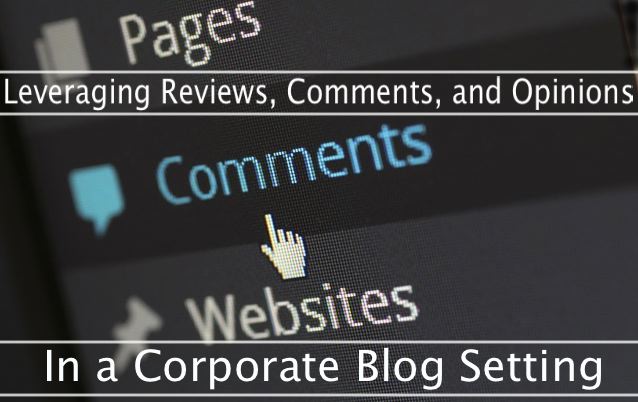Leveraging Reviews, Comments, and Opinions in a Corporate Blog Setting

Editor’s note: This post was written by Matthew, who can be found on the Devumi Social Metrics Blog every Wednesday and Friday talking about what’s happening in the online worlds of YouTube, Twitter, SoundCloud, Instagram, LinkedIn, and Pinterest. Or step into the jungle with the Devumi Gorilla on Twitter for new content all day.
People are going to be making comments, writing reviews, and offering up opinions about your blog all day long. Some of them will be down in your comments section. Others will be on Twitter. Some may even be on other websites.
Wherever you find them, there are a few ways to best use and leverage them to promote your business. Nothing helps a business move forward like word of mouth advertising, this is the online equivalent being put into action!
Address any negative reviews publicly and try to discuss privately
The first review type that you need to leverage is negative ones. Don’t look at them as a black eye, look at them as a permanently upset customer you can dodge and turn into a happy one! They have given you a chance to redeem yourself – take it.
When someone gives you a bad review on Facebook, Twitter, Pinterest, or anywhere else, address it publicly on the post itself. In your message to the upset person, invite them to talk about it offline, or in a private message. This step is important as you don’t need to publicly discuss your problem.
How this is a good leveraging tactic is because you’re giving your other visitors a chance to see that you care. If they know that you’re likely to help them when they have a problem, they’re more likely to come back to you.
@ClipperChip Your accusation of our ranking being based on money is baseless. Contact us if you’d like to discuss: http://t.co/NTuZvI3xRR
— Best VPN Provider (@bestvpns) November 1, 2014
Start a positive discussion to counter their negativity
This connects to the point above, but takes a different tactic. This will usually take place on your blog, you can apply it to any setting though.
You start by thanking the commenter, acknowledging their different viewpoint. Now provide information that paints their issue in a positive light. If they complain that you’re killing the environment, link to and discuss all of your green positive initiatives. If they think your food is unhealthy, link to and discuss all of your good food practices. If they think an idea of yours is dumb, link to and discuss people who agree with you.
The goal is NOT to shame them or make the commenter look stupid. The goal is to inform and educate. Don’t be smug, don’t be rude, just present the facts and try to get a discussion going.
Share people’s positive comments, and always reply
I recently made a positive comment on the Facebook page of a local restaurant. They had incredible food and awesome drinks, so I told them. I had a reply within a day from them saying thank you, and hoping I’d come back again.
Do you know what happened? I came back! Another company asked if they could use my positive Facebook comment for their online marketing. I said of course, and they are now leveraging that over and over again as people see me, a real guy, saying something positive.
Too many people focus on dealing only with negative comments. We found a positive review of our services over here. We tweet it out every now and then, earning us more trust. The more work you put into pushing positive comments, the more content there will be to drown out the haters.
The last benefit of replying to those positive comments is creating brand evangelists – superfans. They’ll remember you, spread your message to others, and act like little marketing departments for you.
Own up to a mistake that has people laughing at you
Every now and then something will happen and it will feel like the whole world is laughing at you. Chevrolet found this out with the embarrassment that was the #Chevyguy incident. It all went down when a member of their marketing team, Rikk Wilde, was presenting a trophy live on air. He wasn’t exactly an expert at presentation:
https://www.youtube.com/watch?v=d3WDcXNSUzE
Painfully awkward. But Chevy took all of the negative and joking online comments they were getting and leveraged that into $5 million worth of free advertising. They did this by joining in on the hashtags that came up and even put it on their website.
In the world of social media, a little humility can go a long way towards turning other people’s negativity into free advertising.
Also read:


